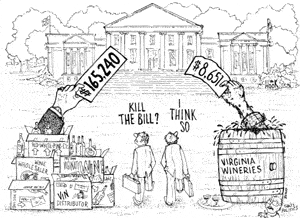NEWS- Out-lobbied: Wholesalers hogtie wineries
Winemaking has become the hip ag business in Virginia, attracting names like Kluge, Matthews, and Warner. Despite its cachet and heady bouquet, winemaking got clobbered January 26 in a House of Delegates subcommittee vote, thanks to the powerful Virginia Wine Wholesalers Association.
"That's because we don't have the money the distributors do," says Bill Moses, chairman of the Virginia Wine Board and CEO of Kluge Estate Vineyard and Winery.
Skip the politics for a moment. At issue is whether Virginia's 107 wineries can bypass the middleman and continue to distribute their own wine– as they have done for the past 26 years.
A federal court ruled last year that the Virginia law allowing wineries to do their own wholesaling discriminated against out-of-state wineries. A new law, HB 1288, might have leveled the playing field by allowing out-of-state wineries to deliver wine in Virginia.
Wine wholesalers, however, fought for their turf, and a General Assembly subcommittee voted 4-1 against the bill January 26.
"I'm a little dismayed, with all the support at the association level– it was so summarily dismissed," says Sarah Gorman, business manager at Cardinal Point Winery in Afton. She had assumed that with the backing of groups like the Virginia Retail Merchants Association, the B&B and Restaurant Association, the Agricultural Council, the Farm Bureau, Virginia Hospitality and Travel, and the winery and vineyard associations, the bill's passage would be a shoo-in.
"The only group speaking against it was the wholesalers," says Gorman, adding, "They gave quite a bit of money."
In fact, the Virginia Wine Wholesalers Association donated over $165,000 to legislators last year, nearly 20 times the $8,650 given by the wineries, according to the Virginia Public Access Project. And the wholesalers were way ahead when it came to schmoozing with delegates.
When Gorman headed to Richmond to lobby, she kept hearing, "We've seen a lot of the wholesalers, but haven't seen the wineries," she says.
Wine Wholesalers lobbyist Charles Duvall did not return phone calls by press time– he was busy over at the Capital, according to his office.
Winery officials say the wholesalers fear any loosening of the three-tier system– the triumvirate of producer/distributor/retailer– mandated since the repeal of Prohibition.
"Essentially it's a state-legislated monopoly," says Moses. "It adds to the cost of wine to the retailers and consumers."
Thanks to the Farm Winery Act of 1980, Virginia farm wineries have been legally self-distributing for nearly 26 years. Not only has this system not hurt the wholesale industry, Moses says, it's enabled the Virginia wine industry to flourish.
"It's not a pretty picture for the fastest growing agricultural business in the state to preserve a monopoly– a highly profitable one at that," says Moses of the wholesalers.
White Hall Vineyards produces about 6,000 cases of wine a year and distributes about one-third of that itself. Proprietor Tony Champ describes how his business would be affected without self-distribution. He makes $10 on a $15 bottle that he delivers directly to a wine shop in town. If he has to pay a distributor, he makes $7 on the same bottle.
"You do the math," he says. "You'll see that's about $40 a case times 2,000 cases. That equals $80,000. That's profit coming off the bottom line. That's hard for a small business." And White Hall is larger than the median winery, which sells just 2,500 cases a year.
Delegate Watkins Abbitt, who represents a piece of Albemarle, was the only subcommittee member to vote for HB 1288. The day before it went to the full committee, he was predicting defeat– unless he could broker a compromise. "The wholesalers," he observes, "are a pretty powerful lobby."
A three-hour meeting January 30 produced compromises that essentially maintained versions of the three-tiered system by, say, allowing wineries to let relatives become their distributors, according to Moses.
"They say you can do indirectly what you can't do directly," he adds.
Moses scoffs at the idea that wineries from California will drive wine across the country to sell in Virginia, calling it a "bugaboo" from the wine wholesalers. "Guys from North Carolina might drive to Danville," he allows. "Think they're going to drive to Fairfax?"
Meanwhile, the state still gets its taxes and the consumer gets more choice. "We're arguing for more competition," Moses says. "They're arguing for less competition."
He predicts the matter ultimately will be decided in court: "In the end, it'll take a lawsuit to destroy the three-tier system. It's an anachronism."
The bill was to go before the full House Committee on General Laws, but on the afternoon of January 31, sources said the bill was dead until lawmakers meet again next year. Moses doesn't sound like he wants to wait that long.
"We'll have more of a chance to present our case in court," he says, "than at the General Assembly."


This was William Moses before courts ruled winery-to-retailer sales illegal.
FILE PHOTO BY JEN FARIELLO
#